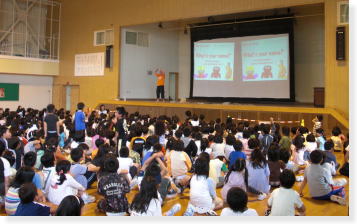Sapporo, Hokkaido, Japan.
 Today’s school is another pilot school and as it’s also the start of the new term in Hokkaido (they get a longer winter holiday) so I also had a demo class for the kids. If you can do Genki English with 30 kids then it’s pretty easy, or actually easier, to just do it with the whole school, which today meant over 600 of them.
Today’s school is another pilot school and as it’s also the start of the new term in Hokkaido (they get a longer winter holiday) so I also had a demo class for the kids. If you can do Genki English with 30 kids then it’s pretty easy, or actually easier, to just do it with the whole school, which today meant over 600 of them.
They were great, as expected (you can always tell how good the kids will be with how the head teacher greets you – he’s a very cool guy!). And I guess this is the main difference between Genki English and the other “experts” who go around doing teaching workshops in the summer, I can’t imagine many of them teaching a handful of kids never mind a full school! You’ve got to be able to practice what you preach.
Communication Skills
Anyway everyone was happy so afterwards they took me on a tour round the classrooms. Half the kids were doing tests, yes this is the first day back after the holidays, and the other half were doing “show & tell” style activities where they’d brought something in that they’d made over the Summer and were presenting it to their class. This is something that will feature more and more in all subjects in primary school when the new course of study comes in in March. The idea being to try and improve the kids’ general communication skills, which along with a “willingness to take on a challenge” are the two main qualities that business leaders say that Japanese students lack when they enter the workplace.
Have fun or else!
However a couple of the classes brought up instant warning flags of things to do in the teachers’ workshop. One was in the 6th grade, where the teachers were ever so sternly telling the kids “enjoy speaking english now!”. To which, of course, the kids just turned their noses up. Setting goals and aiming high is very important, but pushing the kids or “forcing” them to “have fun” can never work. You just have to relax, let them decide what they want to say, then help them to be able to say it.
Next in the 1st year class the kids were asking all sorts of weird and wonderful questions, which is always the great thing about younger kids, you’ve no idea what they’re going to come up with next! One of the kids said “How come you speak Japanese?” to which I replied “How come you speak Japanese?”. One of the other kids said “because she is Japanese”, to which my reply was “ah, so that means if you’re Japanese you can speak it right from being born?” to which they started thinking and started saying “well no, we just started talking with our friends and stuff”. “There you go, that’s just what I did! And that’s how you’ll get really good at English”.
Japanese Face?
But then one kid asked if I was Japanese, a fair enough question, considering some of the kids at the school are of mixed race. But the class teacher instantly jumped in with “Do you think he looks Japanese?! Just look at his face, of course he’s not!” which certainly took me back a bit. Can you imagine that in a school in England or the US? Needless to say she was very apologetic when she’d heard my war speech in the workshop.
And the workshop itself was pretty good. The only thing is that the teachers here have studied more than most, and are hence confused more than most. Although I must admit I was a little unfair. Their curricula is the one I’ve been using for the last few weeks as an example of how not to design one.
DIY disaster?
This is one of the problems with the pilot school system though, all the teachers think they have to make their own system from scratch. But it’s not as easy as it looks. It’s taken me 10 years with a lot of help from thousands of teachers to make Genki English. There are so many subtle things “under the bonnet” that make it work. If you just take from it bit by bit without understand why everything is there, you won’t get the same results.
Anyway, the head teacher was very impressed that all the guest teachers from other schools were congratulating him on inviting me to the school, so that was cool, and the kids were great, and some of the teachers were nearly in tears this afternoon, and I also got to play with their new fifty inch plasma touch screen TV, which would be magical in any classroom.


